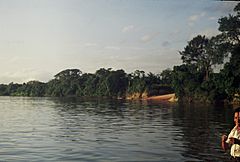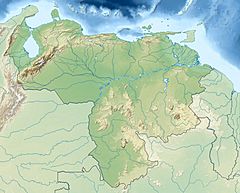Caura River (Venezuela) facts for kids
Quick facts for kids Caura River |
|
|---|---|

Caura River near Maripa, where a ferry crosses it (December 1979)
|
|
|
Mouth location in Venezuela
|
|
| Country | Venezuela |
| Physical characteristics | |
| River mouth | Orinoco 14 m (46 ft) 7°37′44″N 64°53′52″W / 7.628948°N 64.897910°W |
| Length | 723 km (449 mi) |
| Basin features | |
| River system | Orinoco |
| Basin size | 52,000 km2 (20,000 sq mi) |
The Caura River is a very important river in Venezuela. It flows into the mighty Orinoco River, making it a "tributary." The Caura is found in Bolívar State. It's the second largest river flowing into the Orinoco, right after the Caroni River. A huge amount of water, about 3,544 cubic metres per second (125,200 cu ft/s), flows through it every second! This river is also home to two special groups of people, the Ye'kuana and Sanema indigenous communities.
Contents
The Caura River Basin
The Caura River is about 723 kilometres (449 mi) long. It flows through a special area called the Guayanan Highlands moist forests. This area is full of unique plants and animals.
River's Journey and Tributaries
The main river that flows into the Caura is called the Erebato. Both the Caura and Erebato rivers start high up in the Jaua-Sarisariñama Plateau. This plateau is more than 2,000 metres (6,600 ft) above sea level!
Pará Falls: A Mighty Waterfall
You can travel by boat on the Caura River for a long way. But eventually, you'll reach an amazing place called Pará Falls (Salto Pará). This is a huge waterfall! The river splits into two parts around an island before it plunges down. Both parts of the river have some fast-moving sections called rapids. Then, they join together to form one of the most impressive waterfalls in the entire Orinoco river system. It's not the tallest waterfall, but the sheer amount of water flowing over it is incredible!
Blackwater River Characteristics
The Caura is known as a "blackwater river." This means its water looks dark, almost like black tea. This dark color comes from plants decaying in the water, which release tannins. Other rivers like the Caroni and the Ventuari River are also blackwater rivers. Where the Caura River meets the Orinoco, it's very wide. At a spot called Musinacio (Musiú Ignacio), the Caura is about 1,500 metres (4,900 ft) wide. The Orinoco itself is about 5.6 kilometres (3.5 mi) wide at this point!
River Microclimate
When you look at satellite images of big rivers like the Caura and Orinoco, you might notice something interesting. There are often fewer clouds directly above these rivers, especially in the morning. This happens because land and water heat up differently. Land heats up faster than water. In the morning, the land gets warm and sends heat into the air, which can create clouds. But the river water is still warming up, so it doesn't release as much heat into the air. This difference can lead to fewer clouds right over the river itself.
See also
 In Spanish: Río Caura para niños
In Spanish: Río Caura para niños


